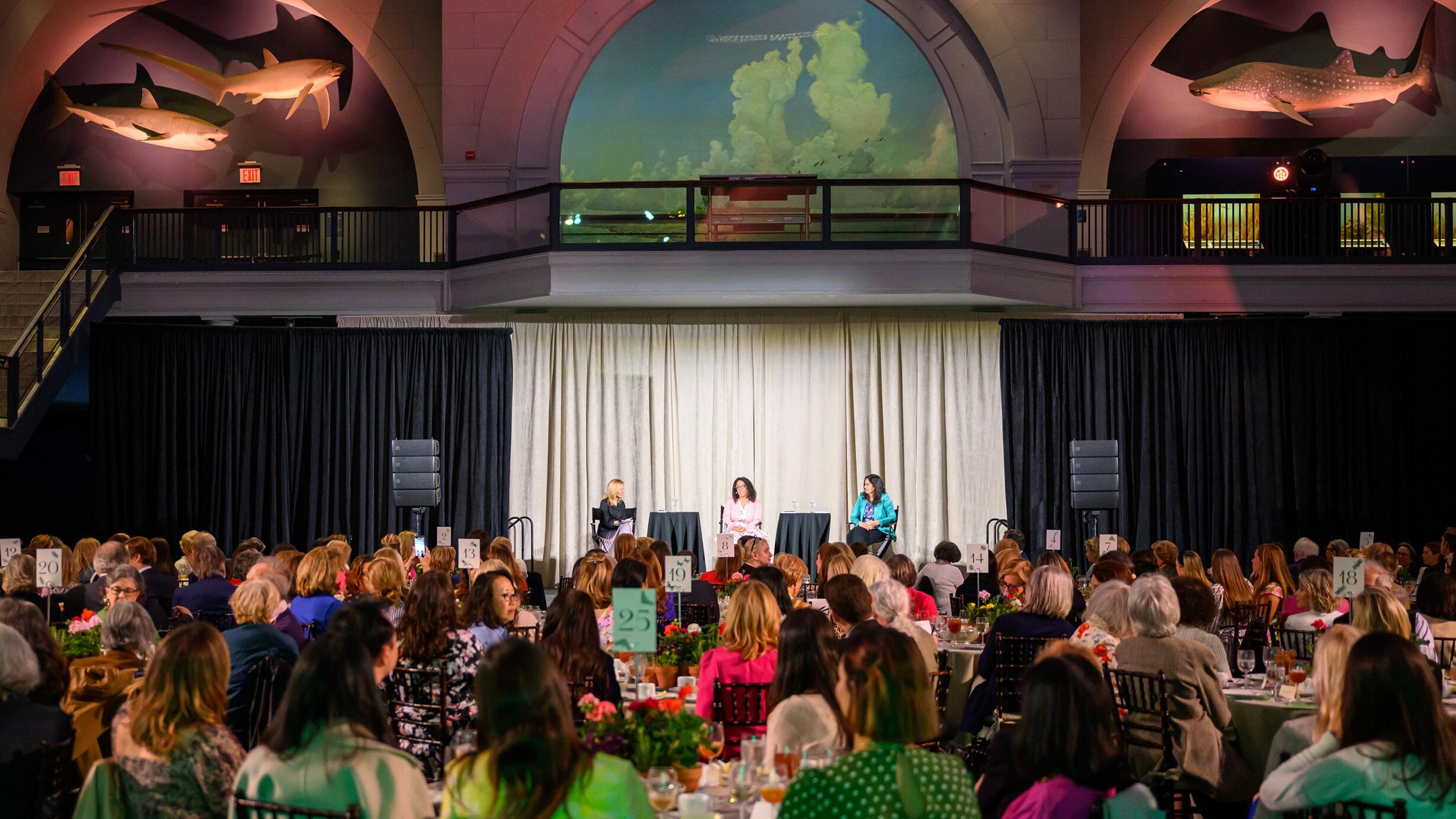The Spring Lunch: Science, Society, and Our Environment
Wednesday, April 17, 2024
 Denis Finnin/© AMNH
Denis Finnin/© AMNH This year's topic, Navigating Climate Challenges Across Sectors, will explore the nexus of science, government, and community in a dynamic discussion about pressing climate, environmental, and sustainability issues. Museum President Sean Decatur will lead the conversation investigating the pivotal roles of scientific research, government policies, business initiatives, and community action in fostering awareness and driving actionable change. Engage with stakeholders from various sectors to unravel how these interconnected entities can collaboratively tackle the intricate challenges facing our environment today.
Ticket sales are now closed. To contribute to the Spring Lunch, please click Make a Gift. Thank you for your support.
Panelists
Sean M. Decatur
President, American Museum of Natural History
Angela Barranco
Executive Director for North America at Climate Group
Rosamond Kinzler
Senior Director for Science Education at the American Museum of Natural History
Kevin Reed
Interim Director of Academic, Research, and Commercialization Programs at the New York Climate Exchange
Event Co-Chairs
Sarah M. Belz
Elena Ende
Katheryn P. Kempner
Alexandra Mondre
Catherine B. Sidamon-Eristoff
The Panel
Sean Decatur, Moderator
Sean M. Decatur became President of the American Museum of Natural History in April 2023, after nearly a decade of distinguished service as president of Kenyon College. He serves on the Board of Managers of Swarthmore College and on the board of directors of the Research Corporation for Science Advancement (RCSA) and the Joyce Foundation, and has served on numerous advisory boards, including the Board on Life Sciences at the National Academy of Sciences, as chair of the Advisory Committee for the Center for the Advancement of Science Leadership and Culture at the Howard Hughes Medical Institute, and as chairman of the Codon Learning scientific advisory board. Prior to joining Kenyon College, Dr. Decatur was dean of the College of Arts and Sciences at Oberlin College, where he was also professor of chemistry and biochemistry. He has won research grants from the National Science Foundation and National Institutes of Health and from private foundations, including the Alzheimer’s Association and the Dreyfus Foundation, and is the author of numerous scholarly articles. He has won numerous awards, including the Foreign Policy Association Medal in 2023, and is a Fellow of the American Association for the Advancement of Science and a member of the American Academy of Arts and Sciences. Decatur earned his bachelor’s degree from Swarthmore College and his Ph.D. degree in biophysical chemistry from Stanford University.
Angela Barranco
Angela Barranco currently serves as the executive director for North America at Climate Group. She brings over two decades of political and policy management experience, including problem-solving, campaign-driven, solutions-focused work on climate, clean energy, clean cars, and protecting natural resources, most recently as Undersecretary of the California Natural Resources Agency. Prior to CNRA, Angela served as chief executive for River LA, deputy chief of staff at the U.S. Department of Housing and Urban Development (HUD), and led climate and environment outreach for the Obama White House as associate director for public engagement of the White House Council of Environmental Quality.
Angela’s extensive climate, policy, and strategic management skills help Climate Group to strengthen partnerships and networks across sectors to drive impact at this urgent moment. Her strong leadership experience helps focus Climate Group North America on accountability and comprehensive emissions reductions that create a more prosperous future for all. She holds a B.A. degree from Columbia University in Environmental & Conservation Biology.
Rosamond Kinzler
Rosamond Kinzler is senior director of science education at the American Museum of Natural History, where she is also the co-director of the Museum’s Master of Arts in Teaching Earth science residency program, the first museum-based standalone master’s degree program to prepare science teachers in the U.S. Before joining the Museum’s Education Division, her research career involved investigating planetary differentiation through melting at Columbia’s Lamont Doherty Earth Observatory and in the Museum’s Earth and Planetary Sciences Department. Dr. Kinzler co-curated the Museum's Gottesman Hall of Planet Earth, which opened in 1999 as part of the Rose Center for Earth and Space, and since 2001, she has led the Museum’s National Center for Science Literacy, Education and Technology, where she currently directs a variety of digital education projects. She is principal investigator for NASA’s Open Space, an engine for dynamic visualization of Earth and space science for informal education and beyond. She received her B.S., M.S., and Ph.D. degrees from the Massachusetts Institute of Technology.
Kevin Reed
Kevin Reed is the interim director of Academic, Research, and Commercialization Programs at the New York Climate Exchange, a new non-profit focused on open exchange and collaboration that empowers sustainable solutions to climate change for New York City and the world. Dr. Reed leads the strategic direction and facilitates the co-development of academic, research, and community programs with a diverse set of academic, industry, and community partners. He is also the associate provost for climate and sustainability programming at Stony Brook University, where he is responsible for facilitating campus-wide initiatives on climate-related topics. Dr. Reed founded and leads the Climate Extremes Modeling (CEM) Group, which focuses on investigating how extreme events, such as hurricanes, may change in the coming decades. He received his Ph.D. and M.S. degrees in Atmospheric Science from the University of Michigan, where he also completed a Graduate Certificate in Science, Technology, and Public Policy and his B.S. degree in Physics.
All contributions are tax-deductible to the extent allowed by law. The non-deductible portion of each table is $1,080 and of each ticket is $135; those values will be reflected on all tax acknowledgements issued for Spring Lunch tickets.
If you wish to purchase tickets through a gift vehicle that does not allow for the receipt of non-deductible benefits, please contact your tax adviser or your donor-advised fund’s (DAF) supporting organization for more information, including the possibility of waiving return benefits or using an alternate funding source.
Generously supported by